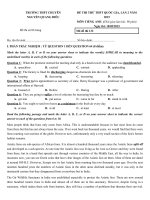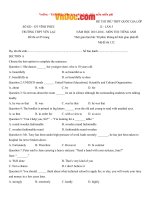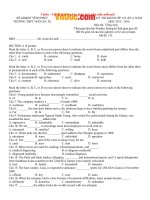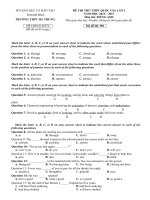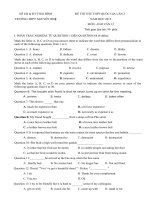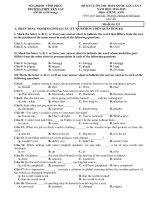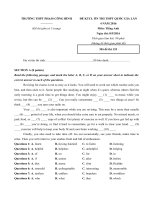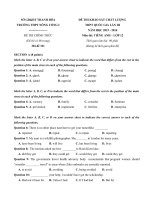Tải Đề thi thử THPT Quốc Gia lần 3 năm 2019 môn Tiếng Anh trường THPT Chuyên Nguyễn Huệ - Đề thi THPT Quốc Gia năm 2019 môn Anh có đáp án
Bạn đang xem bản rút gọn của tài liệu. Xem và tải ngay bản đầy đủ của tài liệu tại đây (127.48 KB, 9 trang )
<span class='text_page_counter'>(1)</span><div class='page_container' data-page=1>
<b>ĐỀ THI THỬ THPT QUỐC GIA MÔN TIẾNG ANH</b>
<b>NĂM 2019 CÓ ĐÁP ÁN</b>
<b>Mark the word whose underlined part differs from the other three in pronunciation in</b>
<b>each of the following questions.</b>
<b> 1:A. said</b> <b>B. raid</b> <b>C. paid</b> <b>D. laid</b>
<b> 2: A. thoroughly</b> <b>B. astronaut</b> <b>C. compete D. atmosphere </b>
<b>Read the following passage and mark the correct answer to each of the following</b>
<b>questions.</b>
<i><b>ssSSSShhh… IT'S A SECRET!</b></i>
Throughout history and in every civilisation, people have felt the need to communicate in
secret. In war time, military secrets need to be transferred securely to commanders without
being understood by the enemy. During revolutions, those plotting to overthrow the
<b>establishment need to ensure their communications remain undisclosed. The history of</b>
secret communication is long and fascinating. World events have changed on many
occasions because of secret messages - secrets that were kept and secrets that were not!
There are two ways to communicate in secret - either you conceal the fact that you are
<i>sending a message at all, (‘steganography’) or you obscure the meaning of your message</i>
<i>rather than its actual existence ('cryptology'), steganography is very old. In 440 BC,the</i>
<i>Greek ruler, Histiaeus, sent a message to a fellow plotter in a revolt by shaving off the hair</i>
of his most loyal slave, tattooing a message on his head, allowing the slave’s hair to grow
back, then sending him to deliver the message.The slave passed through enemy lines easily
since he seemed to be carrying no communication. Another very old form of steganography
is invisible ink. Inks made of simple organic materials such as milk orlemon juice, which
turn dark when held over a flame, were used as early as the first century AD for very serious
<i>communications. During the Second World War, both sides raced to create new secret inks</i>
and to find developers for the enemy'sinks, although in the end this form of steganography
became impractical due to the large amount of communications involved.
</div>
<span class='text_page_counter'>(2)</span><div class='page_container' data-page=2>
and some one finds it, all its secrets will be immediately revealed. This weakness soon led to
the idea of hiding the actual meaning of messages, so that they could not be read, even if
they were discovered. The result was the development of cryptology.
Cryptology hides the meaning of messages by using codes. Codes are essentially secret
<i>languages. Julius Caesar invented one. He replaced every letter in a word by the letter three</i>
places away from it in the alphabet. A was D, B was E, and soon. Later on, any code that
used a system of letter replacement such as this was referred to as a ‘Caesarcode’. Of course,
it doesn’t take much brain power to figure out most of these codes! Today, code makers
devise practically unbreakable codes using highly sophisticated mathematics and computer
power.
Are cryptology and steganography used now? Well, you may be surprised to learn that
secret communication is apart of everyday life! For example, every time you use your credit
<i>card to buy something from a company over the Internet, cryptology is employed. Very</i>
<i>complicated codes turn your credit card number into a pile of gibberish that only the retailer</i>
can decipher, not anyone else, steganography is also thriving in the digital world.
Secret messages can easily be hidden in e-mail, audio and image files. This is because most
digital documents contain useless areas of data, so some of their information can be altered
without obvious effect.This is of concern to governments as they fear that criminals may be
<i>concealing messages in files sent over the Internet. One thing is certain - secret</i>
communication is still just as much a part of life today as it was millennia ago!
[Source: SPOTLIGHT 11, Student’s Book, Express Publishing, 2007]
<b>3: ‘Caesar Codes’...</b>
<b>A. are usually quite easy to break.</b> <b>B. were all invented by Julius Caesar.</b>
<b>C. use sophisticated mathematics. D. only use certain letters of the alphabet.</b>
<b>4: The word undisclosed is closest in meaning to...</b>
<b>A. decoded</b> <b>B. concealed</b> <b>C. unseen</b> <b>D. found</b>
<b>5: In 440 BC, the Greek ruler, Histiaeus...</b>
A. learnt of a plot through a secret message.
<b> B. secretly communicated with the enemy.</b>
</div>
<span class='text_page_counter'>(3)</span><div class='page_container' data-page=3>
<b>D. sent a secret message past the enemy.</b>
<b>6: Invisible ink...</b>
A. can sometimes be made visible with heat.
<b>B. was used the most effectively during WW2.</b>
<b>C. is the oldest form of steganography.</b>
<b>D. must be made from organic materials.</b>
<b>7: Steganography does not...</b>
<b>A. depend on the skill of the messenger.</b> <b>B. pre-date cryptology</b>
<b>C. hide the meaning of a message.</b> <b>D. have any disadvantages.</b>
<b>8: Internet credit card transactions...</b>
<b>A. make a retailer's job easier.</b> <b>B. use steganographic techniques.</b>
<b>C. are made secure by cryptology.</b> <b>D. are hidden in digital files.</b>
<b>9: Secret communication...</b>
<b>A. can lead to revolutions or wars. B. has altered the course of history at</b>
times.
<b>C. was only used in the past. D. was first used by military commanders.</b>
<b>10: Steganography is still used a lot today because...</b>
<b>A. governments use it to send information securely.</b>
<b>B. secret communication is more important than ever before.</b>
<b>C. it can help to catch criminals.</b>
<b>D. it’s easy to hide secret messages in digital documents.</b>
<b>Mark the sentence that best combines each pair of sentences in the following questions.</b>
<b>11: There had been prior warnings of the earthquake. It came as a shock to the people living</b>
<i>in nearby villages.</i>
<b>A. Although they were warned of the earthquake, but the nearby villagers were surprised</b>
when it occurred.
<b>B. The earthquake was warned in advance, so that the nearby villagers were not surprised by</b>
it.
</div>
<span class='text_page_counter'>(4)</span><div class='page_container' data-page=4>
<b>D. The earthquake had been predicted, but the residents of nearby villages were taken aback</b>
when it struck.
<b>12: They report that soil pollution has seriously threatened the livelihood of many local</b>
<i>farmers.</i>
A. The livelihood of many local farmers was reported to be seriously endangered by soil
pollution.
B. It is reported that the livelihood of many local farmers has led to serious soil pollution.
C. Soil pollution is reported to have posed a serious threat to the livelihood of many local
farmers.
D. It has been reported that soil pollution has actually put many local farmers’ lives at risk.
<b>Mark the option that best completes each of the following exchanges.</b>
<b>13: ~ A: "Can I have a word with you for a minute, please?" ~ B: "..."</b>
<b>A. Sure. What is it?</b> <b>B. I haven’t got the time.</b>
<b>C. Of course. That’s what it means. D. It’s easy. Look it up in any dictionary. </b>
<b>14: ~ A: "..." ~ B: "Oh, occasionally. Just for fun."</b>
<b>A. Have you ever been biiten by a dog? B. She’s never said love to you, has she?</b>
<b>C. Do you ever read gossip magazines? D. Does Ms. White often punish her</b>
students?
<b>Read the following passage and mark the correct word or phrase that best fits the</b>
<b>numbered blanks.</b>
</div>
<span class='text_page_counter'>(5)</span><div class='page_container' data-page=5>
<i> On the other hand, some believe that there are some disadvantages to making learning a</i>
foreign language ...(18).... To start with, it is argued that many pupils should improve their
reading and writing skills in their own language first instead of spending time learning
another language that they may never use. Not all jobs, after all, require knowledge of a
foreign language. In addition, some pupils may be put off learning a language for life if they
do not enjoy learning the one taught at school.
Taking everything into ...(19)..., I believe that while there are some disadvantages to being
made to learn a language, the advantages for both individuals and society can not be
ignored."
After all. as the Italian film director, Federico Fellini, said. “A different language is a
different vision of life".
<b> 15:A. thought</b> <b>B. notion</b> <b>C. viewpoint</b> <b>D. item</b>
<b> 16:A. clients</b> <b>B. customers</b> <b>C. buyers</b> <b>D. chasers</b>
<b> 17:A. tricks</b> <b>B. skills</b> <b>C. wits</b> <b>D. talents</b>
<b> 18:A. wanted</b> <b>B. compulsory</b> <b>C. needed</b> <b>D. optional</b>
<b> 19:A. opinion</b> <b>B. concept</b> <b>C. consideration</b> <b>D. thought</b>
<b>Mark the word that differs from the other three in the position of primary stress </b>
<b> 20:A. tremendous</b> <b>B. prosperous</b> <b>C. victorious D. enormous</b>
<b> 21:A. cathedral</b> <b>B. tragedy</b> <b>C. genuine</b> <b>D. satellite</b>
<b>Mark the word(s) OPPOSITE in meaning to the underlined word(s) in each of the</b>
<b>following questions.</b>
<b>22: He has a self-confidence that is sometimes seen as arrogance.</b>
<b>A. pride</b> <b>B. haughtiness</b> <b>C. timidity</b> <b>D. modesty</b>
<b>23: I'm fed up with living in the sticks.</b>
<b>A. at close quarters</b> <b>B. out of reach</b> <b>C. at hand D. with closed fists</b>
<b>Mark the sentence that is closest in meaning to each of the following questions.</b>
<i><b>24: I thought she was the right person for the position, yet it turned put that she was quite</b></i>
<i>useless.</i>
</div>
<span class='text_page_counter'>(6)</span><div class='page_container' data-page=6>
B. I was mistaken about her suitability for the position since she proved rather incompetent.
C. Contrary to my initial impression, she was not totally unsuitable for the position.
D. I was right in thinking that she was totally useless for the job.
<b>25: It’s a pity you didn’t come to the party.</b>
<b>A. Why didn’t you come to the party?</b> <b>B. </b>You should have come to the party.
<b>C. It’s wrong you didn’t come to the party.</b> <b>D. You are pitiful that you weren’t</b>
invited to the party.
<b>26: You mustn’t ride a motorbike without a crash helmet.</b>
<b>A. Riding a motorbike without a crash helmet is banned.</b>
<b>B. It’s prohibited that riding a motorbike without a crash helmet.</b>
<b>C. It’s legal not to ride a motorbike with a crash helmet.</b>
<b>D. It’s against the law to ride a motorbike without a crash helmet.</b>
<b>Read the following passage and mark the correct answer to each of the following</b>
<b>questions.</b>
Most people have recognized the importance of entertainment to their both physical and
mental well-being. There is a variety of entertainment for people to choose, which depends
on their interests, their ages, their jobs as well as many other conditions.
<i> People who work indoors and spend most of their time sitting and doing sedentary office</i>
work can add physical activities to their lives by doing sports during their leisure time, such
as playing a ball game, going camping, hiking or fishing. On the other hand, people whose
jobs involve a lot of physical activities may prefer to spend their free time doing quiet,
relaxing activities, such as reading books or magazines or watching TV. Some people find
that collecting stamps, postcards, badges, model cars, planes or ships, bottles, or antiques are
relaxing hobbies.
Entertainment is organized in many schools and institutions. They may offer many
extracurricular activities including hobby groups, sports activities, and choirs. Other
institutions such as retirement homes and hospitals also offer activities such as clubs and
meetings for playing games or simply organized periods for conversation.
</div>
<span class='text_page_counter'>(7)</span><div class='page_container' data-page=7>
whether it is joining friends for a drink in a pub, dining out in a restaurant, watching a film,
playing video games or dancing the night away at a club.
Some people do leisure activities that also have a long-term goal. In some cases, people do
a leisure activity that they hope to turn into a full-time activity. Many people also study
part-time in evening university or college courses, both for the love of learning to help their
career prospects and for relaxing.
<b>27: According to the second paragraph, the writer means that...</b>
<b>A. playing sports is not suitable for those who work in the office</b>
<b>B. entertainment is chosen depending on people’s career</b>
<b>C. people working indoors should not have any entertainment</b>
<b>D. sedentary office work is boring</b>
<b>28: According to the passage, entertainment...</b>
A. is not good for our both physical and mental well-being
<b> B. has no effect on our mental health</b>
<b>C. is not considered to be important by most people D. is various.</b>
<b>29: According to the fourth paragraph,...</b>
<b>A. going out with friends is also a kind of entertainment</b>
<b>B. playing video is not a kind of entertainment</b>
<b>C. we should only watch a film at home</b>
<b>D. drinking after a hard day at work is unacceptable</b>
<b>30: It can be inferred that people...</b>
<b>A. hardly recognize the importance of entertainment</b>
<b>B. have different choice of entertainment</b>
<b>C. all choose the same kind of entertainment</b>
<b>D. find it difficult to choose a kind of entertainment</b>
<b>31: People who work indoors...</b>
<b>A. should not choose physical activities B. are often too tired to enjoy any entertainment</b>
<b>C. never have any leisure time D. can choose physical activities as entertainment</b>
<b>32: According to the writer, learning part-time in the evening...</b>
</div>
<span class='text_page_counter'>(8)</span><div class='page_container' data-page=8>
<b>C. is not suitable for present careers</b> <b>D. is also a relaxing activity</b>
<b>Mark the letter A, B, C, or D on your answer sheet to indicate the underlined part that</b>
<b>needs correction in each of the following questions.</b>
<b>33: Air pollution, together with littering, are causing many problems in our large</b>
industrial cites today.
<b>A. many</b> <b>B. are</b> <b>C. with D. in our large</b>
<b>34: When we go on vacation, we prefer swim and active sports to sightseeing and lying</b>
on the beach.
<b>A. active sports</b> <b>B. sightseeing</b> <b>C. swim D. on vacation</b>
<b>35: The book that you see laying on the table belongs to the teacher.</b>
<b>A. see</b> <b>B. belongs</b> <b>C. laying</b> <b>D. that</b>
<b>Mark the word(s) CLOSEST in meaning to the underlined word(s) in each of the</b>
<b>following questions.</b>
<b>36: Keep your hair on! Your car isn't badly damaged!</b>
<b>A. Brush up!</b> <b>B. make up yourself!</b> <b>C. Calm down!</b> <b>D. Cool it!</b>
<b>37: You go home and put your feet up, love. </b>
<b>A. take a shower</b> <b>B. go to bed</b> <b>C. relax</b> <b>D. turn in</b>
<b>Mark the correct answer to each of the following questions.</b>
<b> 38: The university administrations are introducing new measures to ... that the</b>
enrolment process runs smoothly.
<b>A. maintain</b> <b>B. improve</b> <b>C. facilitate</b> <b>D. ensure</b>
<b>39:You...not have seen him yesterday, for he was not here.</b>
<b>A. must</b> <b>B. should</b> <b>C. can</b> <b>D. would</b>
<b>40: Not only...us light, but it also gives us heat.</b>
<b>A. the sun has give</b> <b>B. does the sun give</b> <b>C. the sun gives D. has the sun given</b>
<b>41: The population of the world is growing at a dangerous...</b>
<b>A. measure</b> <b>B. costs</b> <b>C. rate</b> <b>D. step</b>
<b>42: We must begin testing this instrument no mater...difficult it is.</b>
<b>A. whatever</b> <b>B. what</b> <b>C. however</b> <b>D. how</b>
</div>
<span class='text_page_counter'>(9)</span><div class='page_container' data-page=9>
<b>A. quite far as</b> <b>B. such far as</b> <b>C. as far as D. very far as</b>
<b>44: When you tell him something, he always does the...on purpose.</b>
<b>A. objection</b> <b>B. opposing</b> <b>C. opposition</b> <b>D. opposite</b>
<b>45: Mary has not seen his brother for five years and has...of his address.</b>
<b>A. no idea</b> <b>B. no thought</b> <b>C. no mind</b> <b>D. nothing</b>
<b>46: I’ve never seen anyone so...to their job as Philip is.</b>
<b>A. keen</b> <b>B. interested</b> <b>C. eager D. dedicated</b>
<b>47: I've thrown away my old trousers. I’ll have to buy...</b>
<b>A. some new pair</b> <b>B. a new one</b> <b>C. some new ones D. a new pair</b>
<b>48: If you...that night, you might have been too late to get your ticket.</b>
<b>A. hadn't hurried</b> <b>B. wouldn't hurry</b> <b>C. didn’t hurry D. hadn't to hurry</b>
<b>49: The committee...among themselves for hours.</b>
A. has been argued <b>B. have been arguing</b>
<b>C. has been arguing D. have been argued</b>
<b>50: Jerry loves snowboarding so much that it’s almost like a drug...</b>
</div>
<!--links-->

